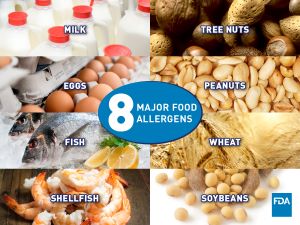Allergy Information on Food Labels
The U.S. Food and Drug Administration (FDA) requires that food labels identify the food source of all major food allergens used to make the food. These allergens are cow’s milk, eggs, fish, Crustacean shellfish, tree nuts, peanuts, wheat, soybeans and, as of January 1, 2023, sesame. The label must state the species of fish (for example, bass, flounder, cod) and Crustacean shellfish (for example, crab, lobster, shrimp). A sharp-eyed reader recently pointed out that the category Crustacean shellfish does not include shellfish that consumers may think of being shellfish such as clams, scallops, mussels, and oysters. These are classified as Molluscan shellfish and are not required to be listed as allergens on food labels in the United States. Most mollusks have a shell with two halves that are connected by a hinge. Other animals including octopus, snail, and squid are also classified as Molluscan shellfish and are not required to be listed as allergens.
You may wonder how this information is relevant to vegans or vegetarians who would not eat shellfish in any form. If you, like me, scan the tiny print on labels looking for “Contains statement” listing of food allergens to see if the food contains non-vegan ingredients like dairy, eggs, fish, or shellfish, you might think a food is vegan-friendly when in reality it has oyster extract as an ingredient. The oyster extract is required to be included in the ingredient listing but it doesn’t have to be included in the “Contains statement” at the end of the list of ingredients. “Contains milk, wheat, and soy” is an example of a “Contains statement.”
According to FARE (Food Allergy Research and Education), the FDA does not consider
molluscan shellfish (scallops, clams, mussels, and oysters) to be a major allergen, so these types of shellfish do not have to be declared on food labels. Canada recognizes both kinds of shellfish as allergens.
I’ve learned my lesson, if I suspect a product could contain oysters, squid, or other Molluscan shellfish, I’ll take a careful look at the full list of ingredients.
To read more about vegans and food allergies see:
Food Allergies and a Vegan Diet
A Soy-free, Nut-free Vegan Meal Plan
Can Anything Be Done to Reduce the Risk of a Baby Developing a Peanut Allergy?
Sesame Seeds to be Included in the List of Food Allergens on Food Labels

